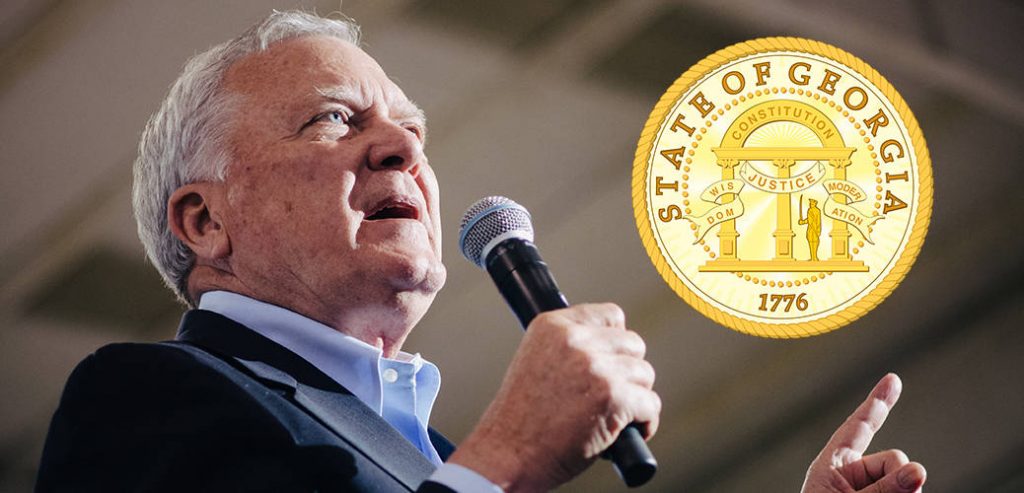In quick succession, the state legislative process of two southern states came into the national spotlight in the past week as Georgia’s governor vetoed a law that would have allowed religious institutions to discriminate on the basis of sexual orientation, while North Carolina’s governor signed into law a bill preventing any municipalities from creating protections for LGBT people above that provided by the state, and requiring that all public bathrooms be restricted to people whose gender as stated on their birth certificate matches that of the bathroom designation.
Surprising no one, both the Georgia and the North Carolina bills have set off national firestorms, with parties on both sides arguing that critical rights are at stake, and large business interests playing a huge role in shaping the public response. The bills – and their different fates – bring up a number of questions:
- What did the bills actually say, and why were they even proposed?
- Would these laws actually affect the rights on both sides of the debate, and, if so, what rights exactly?
- Why did the Georgia bill go down in flames?
- What has been the national response to the North Carolina law?
- What does all this say about similar state laws in the future?
Georgia’s House Bill 757 and North Carolina’s House Bill 2 Explained
Before we go any further, let’s look at exactly what these bills entailed.
In Georgia, House Bill 757, also known as the “religious liberties” bill, would have done the following:
- Prevented clergy members from being required to conduct a marriage or perform any other rites in violation of their religious beliefs
- Allowed “faith based organizations” to not hire potential employees on the basis that their religious beliefs or practices were not in accord with that of the organization
- Allowed the same organizations to refrain from providing social, educational, or charitable services or renting space to third parties on the basis of religious beliefs or practices
The North Carolina law, House Bill 2, enacts the following new provisions:
- Requiring that schools and public agencies have single-sex bathrooms limiting access to people whose biological sex as recorded on their birth certificate is the same as the bathroom’s gender designation
- Preventing municipalities from enacting any discrimination laws related to employment and equal access to public accommodations, thus giving the state and federal governments the only powers to legislate in this area.
Whose Rights Were Actually at Stake in Georgia?
With the Georgia “religious liberties” bill, it is not at all clear that Georgia was facing an epidemic of ministers and faith-based organizations being forced to take actions that were at odds with their beliefs. In fact, Republican Governor Nathan Deal, who vetoed the bill, said, “I can find no examples of any of those circumstances occurring in our state.” If two people of the same sex wish to get married in Georgia, there are innumerable officiants available willing to conduct same-sex marriage ceremonies, thus it is hard to imagine that two people entering into marriage would want it officiated by someone who is opposed to the marriage and thus performing the marriage against his or her will.
And even if forced-marriage-officiating was the goal of the couple, it is also not clear that an officiant could be forced to perform such a ceremony. The US Constitution does provide all people with a right of free exercise of religion under the First Amendment, but federal courts have not ruled on whether requiring persons to comply with anti-discrimination laws against LGBT people violates a person’s First Amendment rights.
Many supporters of religious liberties laws point to a 2015 case in Oregon where a bakery was fined $135,000 by the state Bureau of Labor and Industries for refusing to sell a wedding cake to a same sex couple. The fine was based on the bakery’s violation of a state ordinance outlawing discrimination on the basis of sexual orientation in public accommodations. Notably, the Oregon state law did include an exemption for religious institutions (and, no, a bakery is not a religious institution), which in a way is what the Georgia bill was providing, save for the enormous difference that Georgia was not actually prohibiting LGBT discrimination in the provision of public accommodations, but rather saying, just in case any such legislation is ever passed, religious organizations would be exempted (Georgia is one of 28 states that provide no such protections). Thus, while the Georgia legislature was attempting to create a law protecting a definable and valid right – the free exercise of religion – because there was no perceivable threat to the religious liberty of faith-based organizations, critics and ultimately the governor himself argued the law was unnecessary.
Whose Rights Will Be Affected in North Carolina?
As for the North Carolina law, there are real world implications for the newly enacted bill. With regard to the public bathroom provision, clearly all persons must use the bathroom of the gender stated on their birth certificate. This means that if a person born a male later decides to dress and hold themselves out as a female, and even if that person undergoes a full sex change surgery to transform themselves biologically into a female, then that person must continue to use the mens’ bathroom in all public spaces even if the person is for all other purposes is a woman. Likewise, if a biologically-born woman undergoes treatment to become a man, and sports a full beard, wears a man’s suit, and so on, that person would be required to use the women’s bathroom. While a person’s birth certificate may be changed in order to reflect the gender with which they identify, this may only be done if the person has undergone surgery to change their gender, which is prohibitively costly for many.
Not only does this have implications for the transgender person, it of course has implications for everyone else using the bathroom, and the perceived concern about third parties was the ostensible impetus for the bill. Supporters of such bills have suggested that men who are transgender (meaning they identify as women) would, save for such laws, go into women’s bathrooms for the purposes of sexually assaulting women. While sexual assault is of course a major and widespread societal issue, there appears to be no reported cases of sexual assault being carried out by the process of transgendered persons using the bathroom of the gender with which they identify.
Cross-border Business and the Future of State LGBT Laws
Some observers believe the reason Georgia’s Republican governor vetoed HB 757 was due to the intense pressure that nationwide corporations and entities doing business in Georgia put on the state, including threatening to pull out entirely. In recent years, TV and film production has become a huge industry in Georgia (The Walking Dead and most recent Captain America and Guardians of the Galaxy films were shot there, among many others), and Disney and Marvel threatened to stop doing business in the state if the bill was signed. The NFL also said it would not consider Atlanta in hosting the Super Bowl if the bill was enacted, and companies such as Intel and Dow Chemical made their disapproval of the bill known as well.
For his part, Governor Deal responded to the threats of businesses to stop doing business with the following statement: “Some within the business community who oppose this bill have resorted to threats of withdrawing jobs from our state. I do not respond well to insults or threats.” Deal instead said his veto rested on the fact that the law was unnecessary as Georgia had no laws prohibiting discrimination in public accommodations on the basis of sexual orientation. While the Governor may well be sincere in his stated reasons for vetoing the bill, the chorus of threats from huge businesses around the country most likely made his decision at least a little easier.
North Carolina has faced similar pushback from the national business community on HB 2, and on Tuesday the CEOs of 80 major companies – including Bank of America (which is headquartered in Charlotte), Facebook, IBM, Cisco, and Google – signed a letter to Governor McCrory of North Carolina, asking him to repeal the law and stating, in part:
“We are disappointed in your decision to sign this discriminatory legislation into law. The business community, by and large, has consistently communicated to lawmakers at every level that such laws are bad for our employees and bad for business. This is not a direction in which states move when they are seeking to provide successful, thriving hubs for business and economic development.”
While this was an unambiguously adverse if not surprising response to the law, an even more striking response came from within North Carolina’s government itself when its Attorney General Roy Cooper declared that he would defend the law from two lawsuits filed over its constitutionality and stated, “Not only is this new law a national embarrassment, it will set North Carolina’s economy back.”
As stated above, there are not clear constitutional precedents regarding the validity of so-called religious liberty laws. Furthermore, when laws discriminate based on sexual orientation, they are not treated with the same level of scrutiny under the US Constitution as those that discriminate on the basis of classifications such as race, religion, national origin, or gender.
Which means, for the moment, it will be the political will of the people and their elected representatives’ willingness to stand up to the scrutiny of outsiders and potential hits to the state economy by the decisions of big business that determines whether such laws become a trend nationwide. Ultimately, it will be in the voters’ hands. And in North Carolina, we will get to see this battle come to a head soon as the voters will have their say in just 7 months when Gov. McCrory faces off against Roy Cooper (the Attorney General who called the law a “national embarrassment”) for the North Carolina governorship. Stay tuned.

















![Law in the Digital Age: Exploring the Legal Intricacies of Artificial Intelligence [e323]](https://www.pashalaw.com/wp-content/uploads/2023/11/WhatsApp-Image-2023-11-21-at-13.24.49_4a326c9e-300x212.jpg)
![Unraveling the Workforce: Navigating the Aftermath of Mass Layoffs [e322]](https://www.pashalaw.com/wp-content/uploads/2023/07/Untitled-design-23-300x212.png)
![Return to the Office vs. Remote: What Can Employers Legally Enforce? [e321]](https://www.pashalaw.com/wp-content/uploads/2023/01/Pasha_LSSB_321_banner-300x212.jpg)
![Explaining the Hans Niemann Chess Lawsuit v. Magnus Carlsen [e320]](https://www.pashalaw.com/wp-content/uploads/2022/10/LAWYER-EXPLAINS-7-300x169.png)
![California v. Texas: Which is Better for Business? [313]](https://www.pashalaw.com/wp-content/uploads/2021/07/Pasha_LSSB_CaliforniaVSTexas-300x212.jpg)
![Buyers vs. Sellers: Negotiating Mergers & Acquisitions [e319]](https://www.pashalaw.com/wp-content/uploads/2022/06/Pasha_LSSB_BuyersVsSellers_banner-300x212.jpg)
![Employers vs. Employees: When Are Employment Restrictions Fair? [e318]](https://www.pashalaw.com/wp-content/uploads/2022/05/Pasha_LSSB_EmployeesVsEmployers_banner-1-300x212.jpg)
![Vaccine Mandates Supreme Court Rulings [E317]](https://www.pashalaw.com/wp-content/uploads/2022/02/WhatsApp-Image-2022-02-11-at-4.10.32-PM-300x212.jpeg)
![Business of Healthcare [e316]](https://www.pashalaw.com/wp-content/uploads/2021/11/Pasha_LSSB_BusinessofHealthcare_banner-300x212.jpg)
![Social Media and the Law [e315]](https://www.pashalaw.com/wp-content/uploads/2021/10/WhatsApp-Image-2021-10-06-at-1.43.08-PM-300x212.jpeg)
![Defining NDA Boundaries: When does it go too far? [e314]](https://www.pashalaw.com/wp-content/uploads/2021/09/Pasha_LSSB_NDA_WordPress-2-300x212.jpg)
![More Than a Mistake: Business Blunders to Avoid [312] Top Five Business Blunders](https://www.pashalaw.com/wp-content/uploads/2021/06/Pasha_LSSB_Blunders_WP-1-300x212.jpg)
![Is There a Right Way to Fire an Employee? We Ask the Experts [311]](https://www.pashalaw.com/wp-content/uploads/2021/02/Pasha_LSSB_FireAnEmployee_Website-300x200.jpg)
![The New Frontier: Navigating Business Law During a Pandemic [310]](https://www.pashalaw.com/wp-content/uploads/2020/12/Pasha_LSSB_Epidsode308_Covid_Web-1-300x200.jpg)
![Wrap Up | Behind the Buy [8/8] [309]](https://www.pashalaw.com/wp-content/uploads/2020/11/Pasha_BehindTheBuy_Episode8-300x200.jpg)
![Is it all over? | Behind the Buy [7/8] [308]](https://www.pashalaw.com/wp-content/uploads/2020/09/iStock-1153248856-overlay-scaled-300x200.jpg)
![Fight for Your [Trademark] Rights | Behind the Buy [6/8] [307]](https://www.pashalaw.com/wp-content/uploads/2020/07/Fight-for-your-trademark-right-300x200.jpg)
![They Let It Slip | Behind the Buy [5/8] [306]](https://www.pashalaw.com/wp-content/uploads/2020/06/Behind-the-buy-they-let-it-slip-300x200.jpg)
![Mo’ Investigation Mo’ Problems | Behind the Buy [4/8] [305]](https://www.pashalaw.com/wp-content/uploads/2020/05/interrobang-1-scaled-300x200.jpg)
![Broker or Joker | Behind the Buy [3/8] [304] Behind the buy - Broker or Joker](https://www.pashalaw.com/wp-content/uploads/2020/04/Joker-or-Broker-1-300x185.jpg)
![Intentions Are Nothing Without a Signature | Behind the Buy [2/8] [303]](https://www.pashalaw.com/wp-content/uploads/2020/04/intentions-are-nothing-without-a-signature-300x185.jpg)
![From First Steps to Final Signatures | Behind the Buy [1/8] [302]](https://www.pashalaw.com/wp-content/uploads/2020/04/first-steps-to-final-signatures-300x185.jpg)
![The Dark-side of GrubHub’s (and others’) Relationship with Restaurants [e301]](https://www.pashalaw.com/wp-content/uploads/2015/04/When-Competition-Goes-Too-Far-Ice-Cream-Truck-Edition-300x201.jpg)
![Ultimate Legal Breakdown of Internet Law & the Subscription Business Model [e300]](https://www.pashalaw.com/wp-content/uploads/2019/05/Ultimate-Legal-Breakdown-of-Internet-Law-the-Subscription-Business-Model-300x196.jpg)
![Why the Business Buying Process is Like a Wedding?: A Legal Guide [e299]](https://www.pashalaw.com/wp-content/uploads/2019/03/futura-300x169.jpg)
![Will Crowdfunding and General Solicitation Change How Companies Raise Capital? [e298]](https://www.pashalaw.com/wp-content/uploads/2018/11/Will-Crowdfunding-and-General-Solicitation-Change-How-Companies-Raise-Capital-300x159.jpg)
![Pirates, Pilots, and Passwords: Flight Sim Labs Navigates Legal Issues (w/ Marc Hoag as Guest) [e297]](https://www.pashalaw.com/wp-content/uploads/2018/07/flight-sim-labs-300x159.jpg)
![Facebook, Zuckerberg, and the Data Privacy Dilemma [e296] User data, data breach photo by Pete Souza)](https://www.pashalaw.com/wp-content/uploads/2018/04/data-300x159.jpg)
![What To Do When Your Business Is Raided By ICE [e295] I.C.E Raids business](https://www.pashalaw.com/wp-content/uploads/2018/02/ice-cover-300x159.jpg)
![General Contractors & Subcontractors in California – What you need to know [e294]](https://www.pashalaw.com/wp-content/uploads/2018/01/iStock-666960952-300x200.jpg)
![Mattress Giants v. Sleepoplis: The War On Getting You To Bed [e293]](https://www.pashalaw.com/wp-content/uploads/2017/12/sleepopolis-300x159.jpg)
![The Harassment Watershed [e292]](https://www.pashalaw.com/wp-content/uploads/2017/12/me-2-300x219.jpg)
![Investing and Immigrating to the United States: The EB-5 Green Card [e291]](https://www.pashalaw.com/wp-content/uploads/2012/12/eb-5-investment-visa-program-300x159.jpg)
![Responding to a Government Requests (Inquiries, Warrants, etc.) [e290] How to respond to government requests, inquiries, warrants and investigation](https://www.pashalaw.com/wp-content/uploads/2017/10/iStock_57303576_LARGE-300x200.jpg)
![Ultimate Legal Breakdown: Employee Dress Codes [e289]](https://www.pashalaw.com/wp-content/uploads/2017/08/Ultimate-Legal-Breakdown-Template-1-300x159.jpg)
![Ultimate Legal Breakdown: Negative Online Reviews [e288]](https://www.pashalaw.com/wp-content/uploads/2017/06/Ultimate-Legal-Breakdown-Online-Reviews-1-300x159.jpg)
![Ultimate Legal Breakdown: Social Media Marketing [e287]](https://www.pashalaw.com/wp-content/uploads/2017/06/ultimate-legal-breakdown-social-media-marketing-blur-300x159.jpg)
![Ultimate Legal Breakdown: Subscription Box Businesses [e286]](https://www.pashalaw.com/wp-content/uploads/2017/03/ultimate-legal-breakdown-subscription-box-services-pasha-law-2-300x159.jpg)
![Can Companies Protect Against Foreseeable Misuse of Apps [e285]](https://www.pashalaw.com/wp-content/uploads/2017/01/iStock-505291242-300x176.jpg)
![When Using Celebrity Deaths for Brand Promotion Crosses the Line [e284]](https://www.pashalaw.com/wp-content/uploads/2017/01/celbrity-300x159.png)
![Are Employers Liable When Employees Are Accused of Racism? [e283] Racist Employee](https://www.pashalaw.com/wp-content/uploads/2016/12/Are-employers-liable-when-an-employees-are-accused-of-racism-300x159.jpg)
![How Businesses Should Handle Unpaid Bills from Clients [e282] What to do when a client won't pay.](https://www.pashalaw.com/wp-content/uploads/2016/12/How-Businesses-Should-Handle-Unpaid-Bills-to-Clients-300x159.png)
![Can Employers Implement English Only Policies Without Discriminating? [e281]](https://www.pashalaw.com/wp-content/uploads/2016/11/Can-Employers-Impliment-English-Only-Policies-Without-Discriminating-300x159.jpg)
![Why You May No Longer See Actors’ Ages on Their IMDB Page [e280]](https://www.pashalaw.com/wp-content/uploads/2016/10/IMDB-AGE2-300x159.jpg)
![Airbnb’s Discrimination Problem and How Businesses Can Relate [e279]](https://www.pashalaw.com/wp-content/uploads/2016/09/airbnb-300x159.jpg)
![What To Do When Your Amazon Account Gets Suspended [e278]](https://www.pashalaw.com/wp-content/uploads/2016/09/What-To-Do-When-Your-Amazon-Account-Gets-Suspended-1-300x200.jpg)
![How Independent Artists Reacted to Fashion Mogul Zara’s Alleged Infringement [e277]](https://www.pashalaw.com/wp-content/uploads/2016/08/How-Independent-Artists-Reacted-to-Fashion-Mogul-Zaras-Alleged-Infringement--300x159.jpg)
![Can Brave’s Ad Replacing Software Defeat Newspapers and Copyright Law? [e276]](https://www.pashalaw.com/wp-content/uploads/2016/08/Can-Braves-Ad-Replacing-Software-Defeat-Newspapers-and-Copyright-Law-300x159.jpg)
![Why The Roger Ailes Sexual Harassment Lawsuit Is Far From Normal [e275]](https://www.pashalaw.com/wp-content/uploads/2016/07/WHY-THE-ROGER-AILES-SEXUAL-HARASSMENT-LAWSUIT-IS-FAR-FROM-NORMAL-300x159.jpeg)
![How Starbucks Turned Coveted Employer to Employee Complaints [e274]](https://www.pashalaw.com/wp-content/uploads/2016/07/iStock_54169990_LARGE-300x210.jpg)
